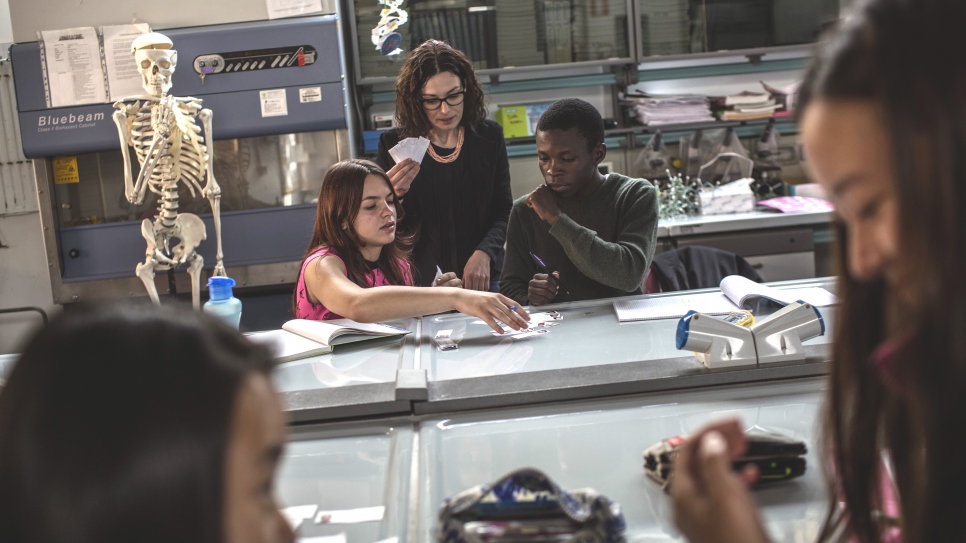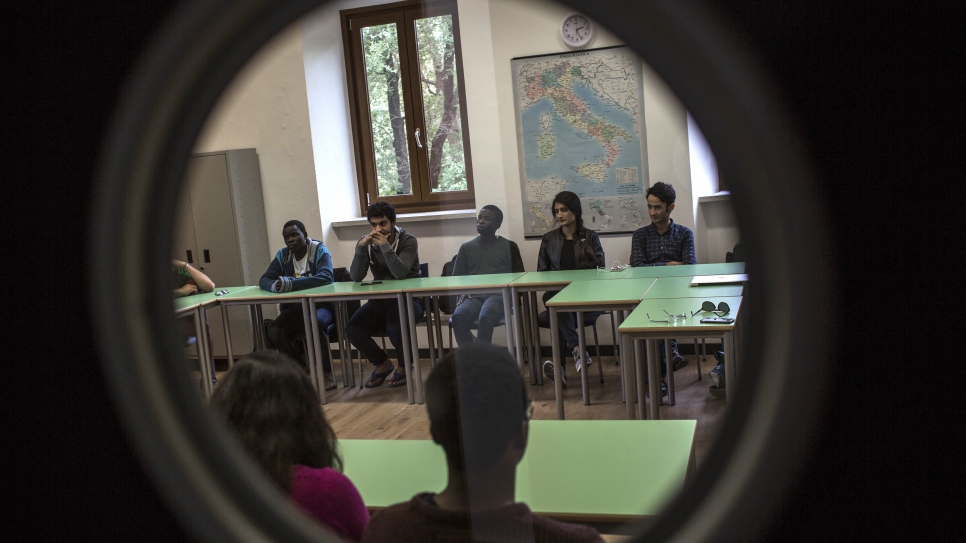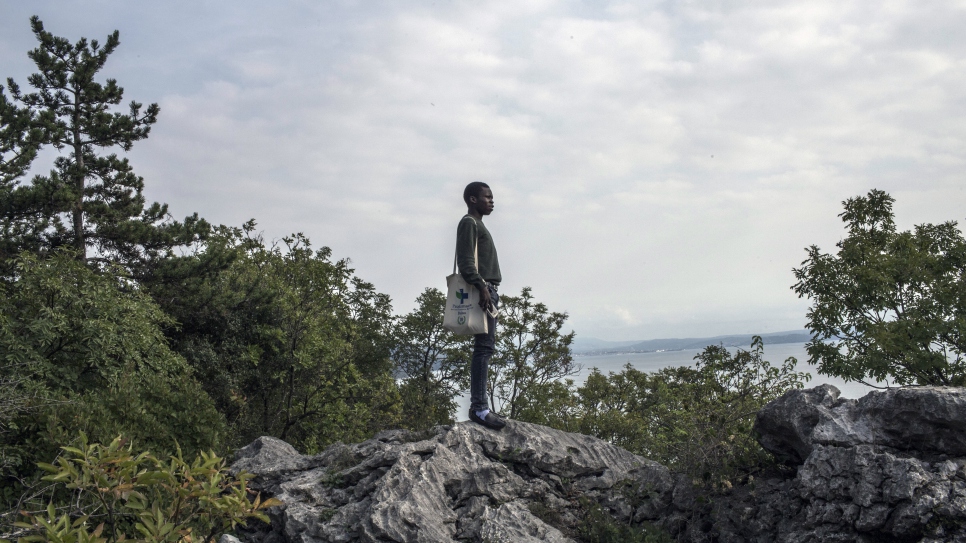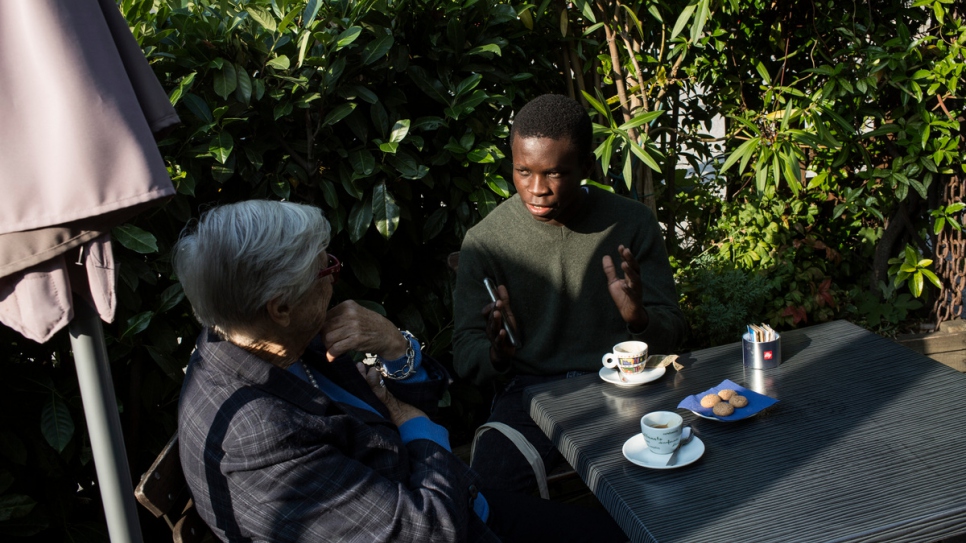In Italy, scholarship gives South Sudanese refugee fresh chance
The UWC Refugee Initiative hopes to double number of scholarships it currently offers to refugees to at least 100.
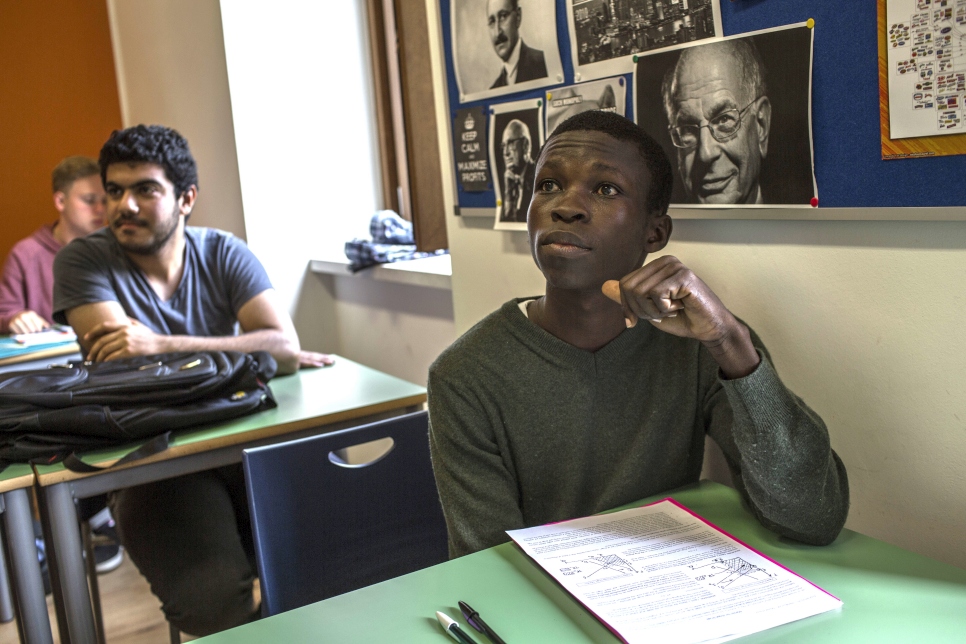
Boboya Emmanuel Sebit Gabu attends an economic lesson with his fellow students at the Adriatic College located in Duino, near Trieste. © UNHCR/Fabio Bucciarelli
DUINO, Italy – On a cliff top overlooking the Adriatic Sea, 18-year-old Emmanuel sits on a rock, doing his economics homework in the late afternoon sun. War overshadowed his childhood and educational opportunities in South Sudan, but now he is catching up academically and making the most of a scholarship to UWC (United World College) Adriatic College in Duino, near Trieste.
“There is a feeling of freedom up here,” he says, spreading out his arms. “A human being is like a tree. When you are in a bad environment, you narrow yourself and your thoughts but in a good place, you expand.”
UWC Adriatic is one of 17 colleges and schools that UWC has established around the globe, teaching the International Baccalaureate (IB). Founded in 1962, UWC is a secular organization with a mission to make education a force to unite people, nations and cultures for peace and a sustainable future. This year, the UWC Refugee Initiative, supported by UNHCR, the UN Refugee Agency, hopes to more than double the number of scholarships it currently offers to refugees, from 47 to at least 100.
The cooperation between UNHCR and UWC is an example of the type of new partnerships needed to advance a comprehensive response, achieve better protection and long-lasting solutions for refugees and widen the options available for those refugees with few prospects of attaining a durable solution.
UNHCR hopes that the UWC Refugee Initiative can grow beyond the initial 100 students that will benefit from UWC’s colleges and schools. Education is crucial for young refugees to build their future, become self-reliant, provide leadership in displacement and rebuild communities recovering from conflict, including in areas of return and in host countries.
Like its sister schools on four continents, UWC Adriatic pursues a policy of “deliberate diversity”, bringing together students from all over the world. It currently has 188 students, of whom 10 are refugees, from over 80 countries doing the two-year IB programme, providing over 70 per cent of students with full or partial scholarships.
“We look for potential young leaders and persuasive students who will go out into the world and make a difference,” says headmaster Mike Price. “At UWC Adriatic, we provide the melting pot and let the students do the melting.”
Emmanuel is in the first semester of his first year at UWC Adriatic. His scholarship is courtesy of Anna Illy, of the famous Italian coffee roasting company Illy, and she has come to the college to meet Emmanuel for the first time. They sit in a café, sipping from small cups, before it is time for him to go to his English class.
Emmanuel’s English is fluent, and he also speaks Arabic and his native Moru tongue. He grew up in Yambio in South Sudan. While still in primary school, he fled conflict and became an internally displaced person in his own country, like millions of others. He later became an orphan, although he does not want to talk about his childhood. The memories are too painful.
“A person can lose hope but you have to believe in what you do.”
After attending secondary school in Bahr Naam, Maridi County, Emmanuel moved to the capital of Juba but ran into fierce battles between government and rebel forces. He fled to Uganda, becoming one of over a million refugees from South Sudan at present being hosted in the neighbouring country. His older sister Raile also fled separately to Uganda. Miraculously, they met up again in Bweyale refugee camp.
A friend from South Sudan called Peter told Emmanuel about the UWC scholarship. Peter himself was too old to apply but encouraged his younger friend. “Peter has a caring heart,” says Emmanuel. “We had a closeness and when I faced challenges, he was like a brother to me.”
But Emmanuel had to take a big risk, giving up the protection he had been given in Uganda in order to return to his home country and to take part in the UWC scholarship interviews in Juba. “I spend most of my time praying,” he says. “A person can lose hope but you have to believe in what you do.”
He was selected by the UWC South Sudan National Committee from 19 candidates. Perhaps his 400-word essay on the war was the decisive factor, or perhaps it was his record of service as a Pathfinder (equivalent to a Boy Scout) in the Adventist church.
Emmanuel has settled in well at UWC Adriatic. He shares a room with a Ukrainian student, while his best friend is a boy from Japan.
“Everything was new,” Emmanuel says. “The weather, the landscape, the people around, so nice and welcoming. I am seeing things differently here.”
Emmanuel is studying economics, philosophy and biology, with mathematics, Italian and English as secondary subjects. After his morning lectures and a quick lunch in the canteen, the cliff top is a peaceful spot in the open air to do his homework.
The trees here remind him of his old school in South Sudan. He admits he is homesick. “I come up here to refresh my mind, to listen to songs on my phone and sing along with them. I miss home. I have lost old friends. But life is not a choice. It’s all about where you find yourself.”
Economics is the subject he hopes will take him to university after he completes the IB, possibly in Europe, and back home again to South Sudan. He is determined to return and make a difference for his own people.

